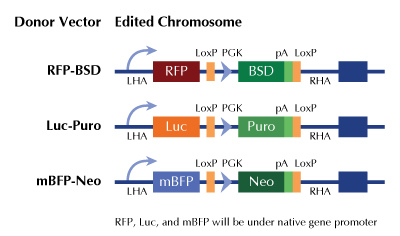Serum Amyloid P (APCS) Human Gene Knockout Kit (CRISPR)
CAT#: KN202802RB
APCS - human gene knockout kit via CRISPR, HDR mediated
Functional Cassette: GFP-puro Luciferase-Puro mBFP-Neo
HDR-mediated knockout kit validation
USD 1,657.00
4 Weeks*
Specifications
| Product Data | |
| Format | 2 gRNA vectors, 1 RFP-BSD donor, 1 scramble control |
| Donor DNA | RFP-BSD |
| Symbol | Serum Amyloid P |
| Locus ID | 325 |
| Components |
KN202802G1, Serum Amyloid P gRNA vector 1 in pCas-Guide CRISPR vector KN202802G2, Serum Amyloid P gRNA vector 2 in pCas-Guide CRISPR vector KN202802RBD, donor DNA containing left and right homologous arms and RFP-BSD functional cassette. GE100003, scramble sequence in pCas-Guide vector |
| Disclaimer | These products are manufactured and supplied by OriGene under license from ERS. The kit is designed based on the best knowledge of CRISPR technology. The system has been functionally validated for knocking-in the cassette downstream the native promoter. The efficiency of the knock-out varies due to the nature of the biology and the complexity of the experimental process. |
| Reference Data | |
| RefSeq | NM_001639 |
| UniProt ID | P02743 |
| Synonyms | HEL-S-92n; PTX2; SAP |
| Summary | The protein encoded by this gene is a glycoprotein, belonging to the pentraxin family of proteins, which has a characteristic pentameric organization. These family members have considerable sequence homology which is thought to be the result of gene duplication. The binding of the encoded protein to proteins in the pathological amyloid cross-beta fold suggests its possible role as a chaperone. This protein is also thought to control the degradation of chromatin. It has been demonstrated that this protein binds to apoptotic cells at an early stage, which raises the possibility that it is involved in dealing with apoptotic cells in vivo. [provided by RefSeq, Sep 2008] |
Documents
| Product Manuals |
| FAQs |
| SDS |
Resources
Other Versions
| SKU | Description | Size | Price |
|---|---|---|---|
| KN202802 | APCS - human gene knockout kit via CRISPR, HDR mediated |
USD 1,657.00 |
|
| KN202802BN | APCS - human gene knockout kit via CRISPR, HDR mediated |
USD 1,657.00 |
|
| KN202802LP | APCS - human gene knockout kit via CRISPR, HDR mediated |
USD 1,657.00 |
|
| KN402802 | APCS - KN2.0, Human gene knockout kit via CRISPR, non-homology mediated. |
USD 1,657.00 |
|
| GA100226 | APCS CRISPRa kit - CRISPR gene activation of human amyloid P component, serum |
USD 1,657.00 |
{0} Product Review(s)
Be the first one to submit a review






























































































































































































































































 Germany
Germany
 Japan
Japan
 United Kingdom
United Kingdom
 China
China
